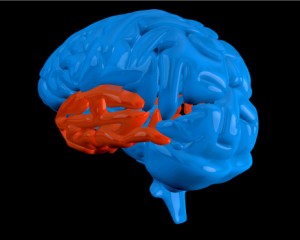Temporal Lobe
 The temporal lobe is one of the four brain lobes. Associated with a number of sensory functions, particularly hearing and speech perception, the temporal lobe is located near the base of the brain on either side of the cerebral cortex. Damage to the temporal lobe can cause lasting effects on a person’s senses, memory, or personality.
The temporal lobe is one of the four brain lobes. Associated with a number of sensory functions, particularly hearing and speech perception, the temporal lobe is located near the base of the brain on either side of the cerebral cortex. Damage to the temporal lobe can cause lasting effects on a person’s senses, memory, or personality.
Roles of the Temporal Lobe
The temporal lobe’s primary role is to integrate and interpret sensory input, both audio and visual, though it also plays a significant role in several other functions. Long-term explicit memory is regulated by the hippocampus, which is housed in the temporal lobe and aids in both memory and spatial navigation. Other functions affected by the temporal lobe include language comprehension, personality, and behavior, particularly sexual and social behavior. Libido depends on the temporal lobe, and so do personality traits such as irritability and agitation, which are produced in the temporal lobe.
Damage to the Temporal Lobe
A person with damage to his or her temporal lobe may be able to see or hear stimuli but be unable to categorize or name it. The effect of damage to the temporal lobe is partially dependent upon which side is damaged. Damage to the left side of the temporal lobe, for example, can result in difficulty remembering or articulating visual or auditory stimuli. Damage to the right side, however, is more likely to interfere directly with the perception of sensory stimuli. For example, a musician who develops a lesion of the right temporal lobe may lose his musical abilities. Damage to the temporal lobe affects behavior and abilities in a number of ways that may not always be predictable and that are partially dependent upon the specific area in the temporal lobe that is damaged.
Temporal lobe epilepsy, which can result from either brain injury or seizure and fever, is one of the better-known sources of temporal lobe damage, and long-term damage may result from this type of epileptic seizure. Seizures of the temporal lobe often affect personality, causing lasting effects such as paranoid behavior, rage and aggression, altered sexual behavior, and perseverative speech. Those experiencing a temporal lobe seizure may feel almost nothing, or they might feel intense fright or pleasure, or experience old memories or foreign emotions.Both Alzheimer’s and Parkinson’s cause changes in the temporal lobe, particularly in the hippocampus. Alzheimer’s often destroys cells in the hippocampus first, and this results in the memory difficulties that are characteristic of the condition. Those with Parkinson’s tend to have more atrophy in the hippocampus than people who do not have the disease.
References:
- American Psychological Association. (2009). APA concise dictionary of psychology. Washington, DC: American Psychological Association.
- Holmes, G. (2013, September 1). Epilepsy Foundation. Retrieved from http://www.epilepsy.com/learn/types-epilepsy-syndromes/temporal-lobe-epilepsy.
- Simpson, J. (2013, August 16). Temporal Lobe Functions. Retrieved from http://www.livestrong.com/article/23820-temporal-lobe-functions/.
Last Updated: 08-28-2015
- 7 comments
- Leave a Comment
Brenda
July 7th, 2016 at 9:54 PMMy husband was recently diagnosed with temporal and frontal lobe epilepsy. We are searching for a psychologist who is familiar with the changes in behavior and personality so we can gain a better understanding and hopefully coping skills. We reside in Alaska and would be open to telemedicine for ongoing therapy. Thank you for any assistance you can provide.
Claudia A. C.
November 10th, 2017 at 11:41 PMMy deceased ex husband had mental issues that are now being exhibited by my 59 year old son even though they had almost no actual contact with each other since my son was 1 year old. These include suicidal ideation (2 members actually committed suicde and 3 others tried). Also paranoia, agorophobia and Most Notably constant ruminating about past negative events with complete inability to move on with life. Is there any brain syndrome with a hereditary component that this sounds like. Also, my ex husband died of Parkinson’s disease and our son has now developed a significant tremor in his right hand.
Rosi
May 30th, 2018 at 8:46 AMLook into ancestral healing. Often we energetically carry the imprint of our ancestors diseases. Some ancestral healing would be beneficial in removing this imprint.
Leave a Comment
By commenting you acknowledge acceptance of GoodTherapy.org's Terms and Conditions of Use.

